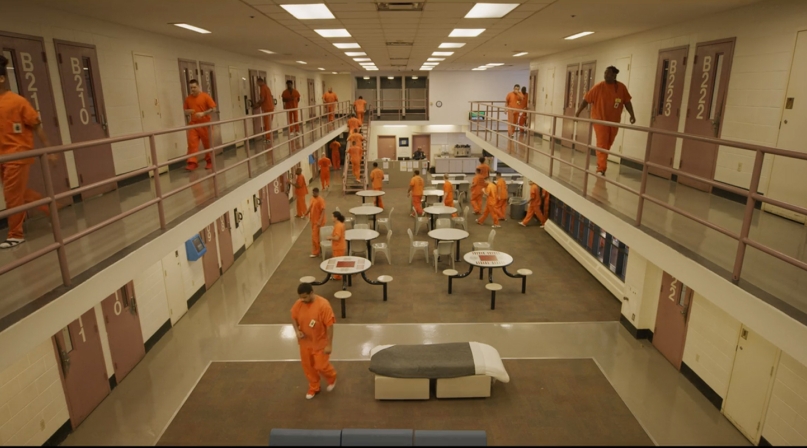County jails weigh documentary pitches

Key Takeaways
Two inmates at the Gwinnett County, Ga. Jail talked about the weapons and drug charges they were facing. They wondered about how the third man, now in another part of the jail, was reacting to his surroundings.
“I’m not going down for no case. He got to fess up. It’s his first…charge,” one said.
His friend was quick to remind him, “Don’t forget, you’re on a mic.”
That exchange, and many others, were captured on a recent Netflix series “First and Last,” chronicling the beginning and end of inmates’ stints in the Gwinnett County Jail. The documentary and others like it wouldn’t be possible without cooperation from sheriffs’ offices, which must weigh the pros and cons of participation in these projects.
“We wouldn’t allow any filming that would interfere with our operations or put the safety and privacy of inmates or the public at risk,” said Shannon Volkodav, public information officer for the Gwinnett County Sheriff’s Office. “We weigh a number of considerations when granting those requests — how much time it will take, what they’ll be asking — the sheriff (Butch Conway) ultimately makes the call.”
Learn More
The crew was in and out in about eight weeks.
Conway and his staff were familiar with the filmmaker after the jail served as the location for “Cellblock 6,” which examined the lives of women in the Gwinnett County Jail in 2010.
“Across the board, anytime someone is filming here, whether it’s local media or a film crew, we always ensure inmates and workers who don’t want to be filmed have their faces blurred. If they do want to participate, they sign waivers,” Volkodav said.
The pair talking about their charges? They knew people would be listening; they signed the waivers, given that it would be months between the filming and release, they weren’t gaming the system in any way, but their exchanges still offered an inside view to corrections officers who aren’t normally privy to conversations among inmates.
“We definitely see a different side because we’re not sitting around talking to inmates about their private lives,” Volkodav said. “And these filmmakers follow inmates after they leave the jail, so that’s more insight than we usually get.”
The “First and Last” crew’s arrival was a boon to the county and its employees over its eight weeks in town.
“They infused our community with money, they hire local caterers, stay in local hotels, hire local truck drivers, actors… most of those people are from Gwinnett County,” Volkodav said. “And the film companies hire our off-duty deputies to provide security on the set, so it gives them a chance to earn extra income.”
Allowing the A&E Network show “60 Days In” to film in the Clark County, Ind. jail was an opportunity for Sheriff Jamey Noel to learn the ins and outs of the jail for which he had recently taken custody. He took the network’s initial pitch for the show and helped revise it for greater impact.
“They wanted to send an undercover state trooper into jail for a weekend and do a series about first-timers,” Noel said. “That would have just given us a police officer’s perspective on what’s going on and not help us get into the mindset of what it would take to discourage people from winding up in jail.”
Noel worked with the show’s producers to come up with the ultimate concept: seven civilians going undercover as inmates for 60 days. Noel kept the program a secret from all but a few jail personnel, and within a few months, two seasons were filmed. The next two seasons were filmed in Fulton County, Ga.
Ultimately, both jails allowed filming because it gave the public a chance to see how things work in jail, with hopes that what they saw would help deter the kind of criminal activity that would cause someone to wind up locked up.
“We’re proud of our jail facility — it’s very clean, orderly and secure,” Volkodav said. “It’s a great way to highlight the good work we do here every day.”
Noel was just months into his administration of the jail when filming for “60 Days In” began, so he was still learning the ropes, but if the camera seemed to add 10 pounds of contraband, he appreciated the learning experience.
“There’s a lot of exposure,” he said. “It was a little scary because nine times out of 10, the camera would catch something wrong before it ever came to my knowledge.”
Noel’s only editing rights involved threats to jail security, like exit codes for doors.
“It was a good tool for me to help improve what we were doing, show corrections officers what they were doing, and gain some perspective and feedback from our undercovers after they did their exit interviews.”
He did regret, however, that the short break between seasons didn’t give him a chance to implement changes after the first set of undercovers came out.
“I’m sure people watching at home saw things stay the same and think ‘they had all of that time to fix things, why didn’t they?” Noel said. “We only had a week or two before they filmed the second season.”
For Volkodav, watching “Cellblock 6” is like looking into a time capsule. The series featured Capt. Laura Hicks prominently, years before she died of cancer.
“It’s really cool to see your coworkers on TV, but it’s really special to see glimpses of her,” she said. “She’s been forever immortalized, and those images will last a lifetime. It’s special for those of us who knew her.”

Attachments
Related News

White House signs executive order examining state and local preparedness
On March 18, President Trump signed an Executive Order aimed at aligning federal preparedness and response doctrines, while examining state and local preparedness capabilities. The order does not shift any responsibilities or costs to state and local governments, rather producing a set of recommendations for better collaboration across all levels of government.

CMS announces extended funding application period to improve the continuity of care for justice-involved individuals
On September 27, the Centers for Medicare & Medicaid Services announced $106.5 million in state planning grants aimed at improving healthcare continuity for individuals transitioning from incarceration.

Congress reintroduces bipartisan disaster mitigation bill to support homeowners
On March 5, Disaster Mitigation and Tax Parity Act (H.R. 1849) was introduced to the U.S. House of Representatives. This introduction follows the late-January introduction of the same bipartisan legislation in the Senate (S. 336). NACo previously supported this legislation and continues to advocate for its passage to support county resilience efforts.
